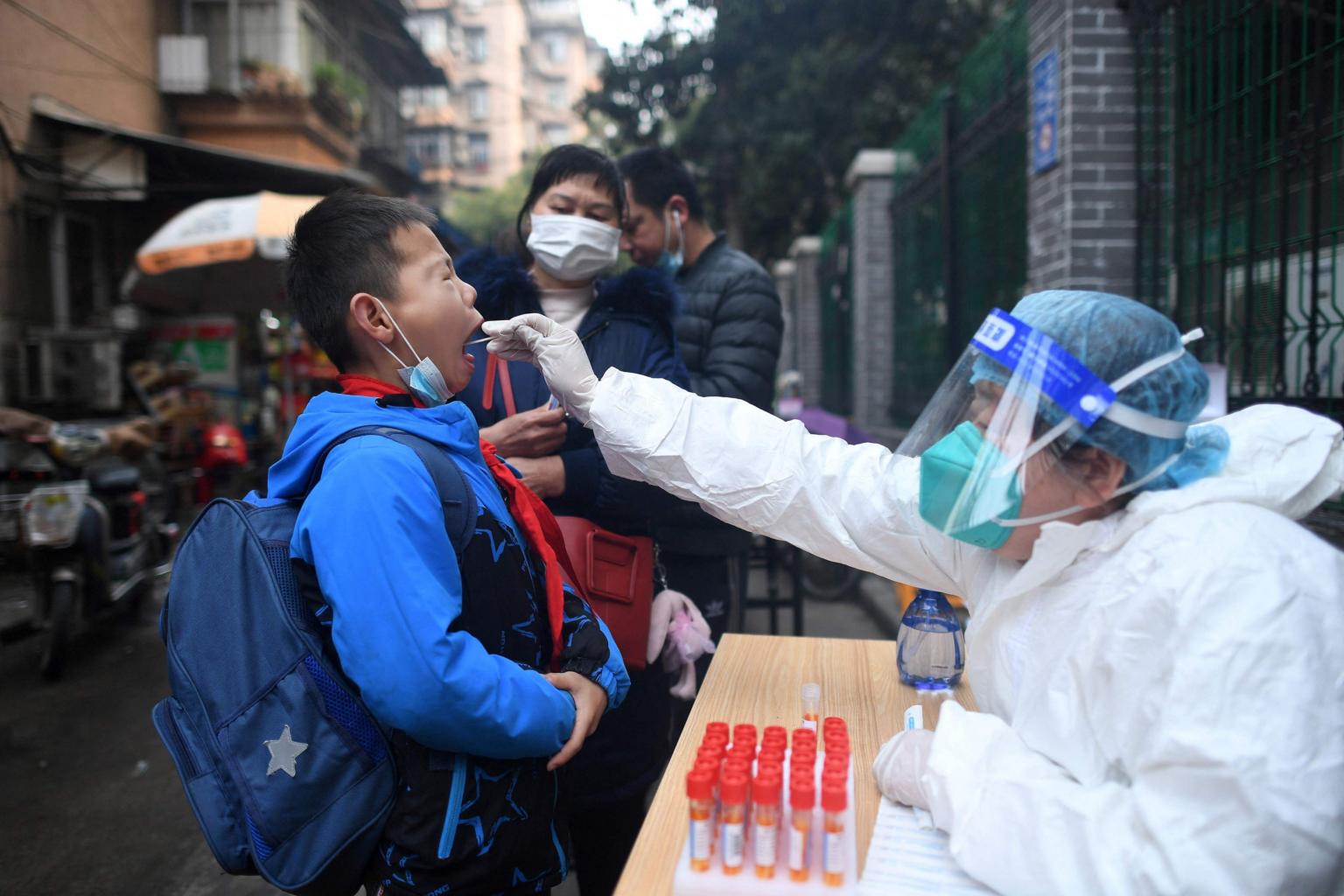China seeks balance between Covid-19 control and growth; reopening unlikely
Sign up now: Get insights on Asia's fast-moving developments

A boy undergoes a nucleic acid test for the coronavirus in Wuhan in China's central Hubei province on March 4, 2022.
PHOTO: AFP
BEIJING - Chinese Premier Li Keqiang on Saturday (March 5) indicated that China is unlikely to ease coronavirus-related border control measures for now, as it continues to seek an equilibrium between epidemic control and economic growth.
Presenting the government's annual work report at the opening session of China's Parliament, the National People's Congress, Mr Li said that consumption and investment recovery from the Covid-19 pandemic was sluggish.
"To prevent inbound cases and domestic resurgences, we need to constantly refine epidemic containment measures, strengthen epidemic controls in port-of-entry cities, step up efforts to study and protect against virus variants, accelerate (research and development) of vaccines and effective medicines, and continue implementing vaccination programmes," he said.
"Occurrences of local cases must be handled in a scientific and targeted manner, and the normal order of work and life must be ensured."
China’s policy ‘worth it’
During a press briefing on Friday, NPC spokesman Zhang Yesui had said that while China’s approach might come with costs, it was effective and “worth it” as it protected people’s lives and health.
“China is one of the most successful countries in the world in epidemic prevention, no matter whether viewed in terms of the number of confirmed cases and deaths, or in terms of economic development,” he said.
“It is precisely by insisting on strong and effective prevention and control measures that – while maintaining its own economic and social development – China has continued to contribute significantly to keeping the global industrial and supply chain running in a smooth and stable manner, as well as to the growth of the world economy.”
Mr Zhang’s remarks echoed comments made by the head of China’s Covid-19 expert group, Dr Liang Wannian, who said “coexisting” with the virus is still not an option for China.
Domestically, the country has adopted what it calls a “dynamic zero” policy, enforcing targeted lockdowns and mass testing, and quarantining all who test positive as well as their close contacts.
Describing the “dynamic zero” policy as a “magic weapon”, Dr Liang said the Omicron variant is still capable of putting great strain on the country’s healthcare system.
There has been speculation over the past week that China might soon relax its stance on Covid-19 management, after Dr Zeng Guang, former chief epidemiologist with the Chinese Centre for Disease Control and Prevention, said in a social media post that the country’s “dynamic zero” policies might not be in place forever.
“Not far into the future, at an appropriate point in time, a Chinese-style roadmap for coexisting with the virus will present itself,” he wrote on the Twitter-like Weibo.
Sporadic outbreaks
Even as it battles pockets of Covid-19 outbreaks in several cities, China has reported relatively fewer cases compared with most other countries.
Officials said there were 281 new Covid-19 infections on Friday, of which 179 were imported. Most of these cases stemmed from Guangdong province, bordering Hong Kong, which is battling its worst surge of the virus since the start of the pandemic.
Nearly 2,800 delegates were gathered at the cavernous Great Hall of The People in Beijing for China’s largest political gathering of the year. But 161 were unable to attend, many because of Covid-19 restrictions.
Mr Li also reminded officials that there is “room for improvement” in government work.
“Cases of becoming detached from reality and acting against the public will are still frequent,” he said. “Some local governments use one-size-fits-all or campaign-style approaches in policy implementation.”
The remark was a veiled reference to local officials who arbitrarily imposed onerous quarantine restrictions or travel bans in response to Covid-19 infections.
Earlier this year, officials in Shandong province put a blanket ban on travellers from Beijing after several cases showed up in the capital city. The policy was later reversed following a public outcry and a rebuke from the National Health Commission.
Since March 2020, China has put in place some of the world's strictest border control measures, virtually shutting the country to all travellers except in special cases. Those allowed into the country serve between 14 and 28 days of centralised quarantine.
Those entering Beijing face a 21-day quarantine.
Airlines allowed to operate weekly flights into China are also heavily regulated: Those found importing five or more Covid-19 cases for two consecutive weeks face a two-week suspension. This resulted in a mass cancellation of flights, including from Singapore, during the recent Omicron wave.
Domestically, China has adopted what it calls a "dynamic zero" policy, enforcing targeted lockdowns and mass testing, and quarantining all who test positive as well as their close contacts.
But this has taken a toll on the economy: China's services sectors, particularly small and medium-sized businesses in tourism, catering, entertainment and retail, have been hit particularly hard by the control measures.
Citizens are also reluctant to travel, for fear of getting caught up in flash lockdowns or inadvertently being required to quarantine due to sporadic outbreaks.


